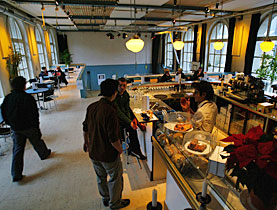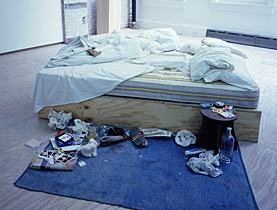Capital voters to choose – arts or business

Voters in Bern will decide on May 17 whether to hand over the keys of a thriving cultural centre to the 150 resident artists - or a corporate developer.
The public is best placed to decide who should win this struggle between art and commerce, urban planning experts say. But they warn that a decision to close the cultural centre should not be taken lightly.
Real cultural spaces that are run by artists themselves are hard to keep and need to be protected, argues Kersten Höger, a lecturer at the Institute for Urban Design at the Federal Institute of Technology in Zurich.
The cultural centre is also helping put Bern on the cultural map, campaigners say.
“A public vote should definitely be involved in such decisions of public value,” noted Nicolas Kretschmann, an urban planning architect.
The issue revolves around a sought-after building, a rambling former school in the centre of Bern, occupied by the Progr cultural centre on an interim basis for the past four years. Classrooms have since been transformed into a kaleidoscope of different artists’ studios, from avant-garde sound engineers to fashion designers.
With their lease up in July, the city decided to put the building out to tender and accepted plans by Zurich developer AllReal to turn it into a health centre.
But in a sudden turnaround last autumn, the authorities decided to offer Progr the chance to come up with the minimum SFr12million ($10 million) needed to buy and renovate the historic complex.
When they succeeded, it was decided to give the Bern electorate the final say on who could buy the building.
Critics say the authorities’ decision has put their reputation for competitive tendering at risk. It has also resulted in a legal challenge by the rightwing Swiss People’s Party over the validity of reversing the tender outcome, the decision of which is still pending.
Mixed use
AllReal describe the situation as “very negative”. “We participated in this competition, we were named as the winner and more or less from one moment to the other things changed in a way which is really difficult to understand,” said spokesman Matthias Meier.
Their SFr25 million project, dubbed Doppelpunkt, has evolved over time into plans for a health centre and a school, with the current live music venue to be retained. The health centre would provide a cheaper option for people needing simple treatments, instead of going to a hospital.
“We are convinced that this combination of the three different uses will ensure that the people living in Bern will get something from the building in the future,” explained Meier.
“We will see if the people in Bern, or the majority of them, see it the same way. At the end of the day we have to accept whatever the majority decides.”
In mobilising their campaign to stay, Progr gained pledges of financial support from 120 people, including Swiss billionaire Hansjörg Wyss, within a six-week deadline. “This is the proof that the people in Bern want it and want to support us,” said Peter Aerschmann, president of the Pro Progr campaign.
“Bern did not really have an art scene before. All the artists went away to Zurich or Berlin. Now there is a growing art scene. There are more than 150 artists in this house, all kinds of artists. It’s really a great mix that I have not seen elsewhere in the world.”
A capital city should be both culturally and politically significant, he says.
“We are in the middle of Europe; it is really interesting for someone on the continent to be here. Artists come from other countries as artists in residence. For us in Bern it is really important to do this networking. There are smaller cities with a name in the arts scene and this is a chance for Bern too.”
Opponents say the cultural centre is not a financially viable option in the long-term, which Aerschmann counters by noting the future of the building is safe as contractually it reverts to the city if the centre fails to pay the rent.
“Breeding grounds”
On a town planning level, experts note that, more than in corporate endeavours, such “low budget” arts centres have a history of sparking off development in urban areas.
“Such informally started cultural centres are often promising urban catalysts and breeding grounds for further, more established cultural programmes,” said Kretschmann.
Fellow architect Höger points to two similar cases in Zurich, one in the west of the city where an artistic subculture revived an area but the artists were priced out of the area. In a different case, new builds were created to keep artists in the area.
She says a solution for the situation in Bern could be for the developers to set aside part of the building for artists.
“There is a trend in urban design worldwide where developers like AllReal have discovered that in supporting high culture, in offering low budget spaces, they can benefit from it too.
“I think it is good for sustainability and also the commercial-private projects become more valuable.”
swissinfo, Jessica Dacey
Sale price for the former ProGymnasium – $2.4 million
Progr is managed by foundation with a board of trustees who manage the building and bear financial responsibility. The centre includes studios and has an exhibition area and music venue open to the public. Progr’s annual rent SFr650,000.
Progr funding plan: Donations for the proposal purchase – SFr2,047,300. Letters of intent for loans SFr4,515,200. Guaranteed bank loans – SFr5.5 million
AlReal plans: Build health centre and school for 160 students. Retain music venue. Remodel public courtyard. Total investment SFr25 million.
Progr plans: Repair roof and exterior of building (costs estimated at SFr8 million). Remodel public courtyard.

In compliance with the JTI standards
More: SWI swissinfo.ch certified by the Journalism Trust Initiative













You can find an overview of ongoing debates with our journalists here . Please join us!
If you want to start a conversation about a topic raised in this article or want to report factual errors, email us at english@swissinfo.ch.